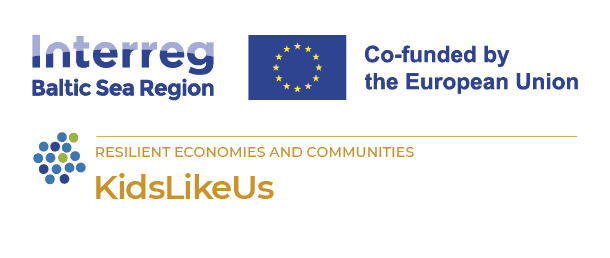
KidsLikeUs project presented during the 14th Annual Forum of the EU Strategy for the Baltic Sea Region in Riga
23 October 2023
During the opening session, the European Commissioner for Cohesion and Reforms, Elisa Ferreira, in her message to the event participants, drew attention to the most important challenges the Baltic Sea region has been facing and referred to the topic of shaping future cohesion policy. Normunds Poppens, DG Regional and Urban Policy of the European Commission, in his opening speech of this year’s Annual Forum of the EU Strategy for the Baltic Sea Region, emphasized the need to present the results of territorial cooperation at the international scope.
Beata Fabisiak participated in the panel entitled “Past achievements, new solutions and opportunities for future cooperation”, illustrating how Interreg projects help in implementing the EU strategy for the Baltic Sea region. Two representatives of already completed projects – PURE and SEMPRE, as well as two representatives of currently implemented projects – Waterman and KidsLikeUs, were invited to participate in this program session. The panelists agreed on the added value generated during the implementation of transnational Interreg projects. They emphasized that international cooperation supports the process of joint learning, which allows us to better cope with existing and new challenges. Björn Grönholm, representing the PURE project, noted that “The Interreg Baltic Sea Region Program has an important task in putting into practice this new approach to look at water as a resource.” In turn, Tobias Facchini, implementing the Waterman project, drew attention to the need to use water resources more widely – “We need to change the mindset and learn to use, not only fresh water, but water of different quality for different purposes.” Projects improving the quality of life and supporting particularly vulnerable social groups were presented by Anna Broka from Vidzeme University of Applied Sciences and Beata Fabisiak from the Poznan University of Life Sciences.
“Interreg provides a unique possibility to join the scientific world with practitioners representing municipalities, public institutions, and NGOs which gives an extreme boost in generating ideas and seeing them implemented in the real world for the real people.” formulated Beata Fabisiak from KidsLikeUs.
Project representatives also drew attention to the importance of building new partnerships and mutual trust. Beata Fabisiak noted that “Projects create an invisible net that connects people, strengthening the habit of cooperation across borders.” Esa Kokkonen, policy area coordinator for innovation, highlighted examples of new partnerships composed of hundreds of people participating in projects important for the implementation of innovation policies in the Baltic Sea region.
Nathalie Verschelde from the European Commission (DG Regio) summed up the panel by saying: “It is quite clear that cooperating with each other, working across borders, is the only way forward.”







